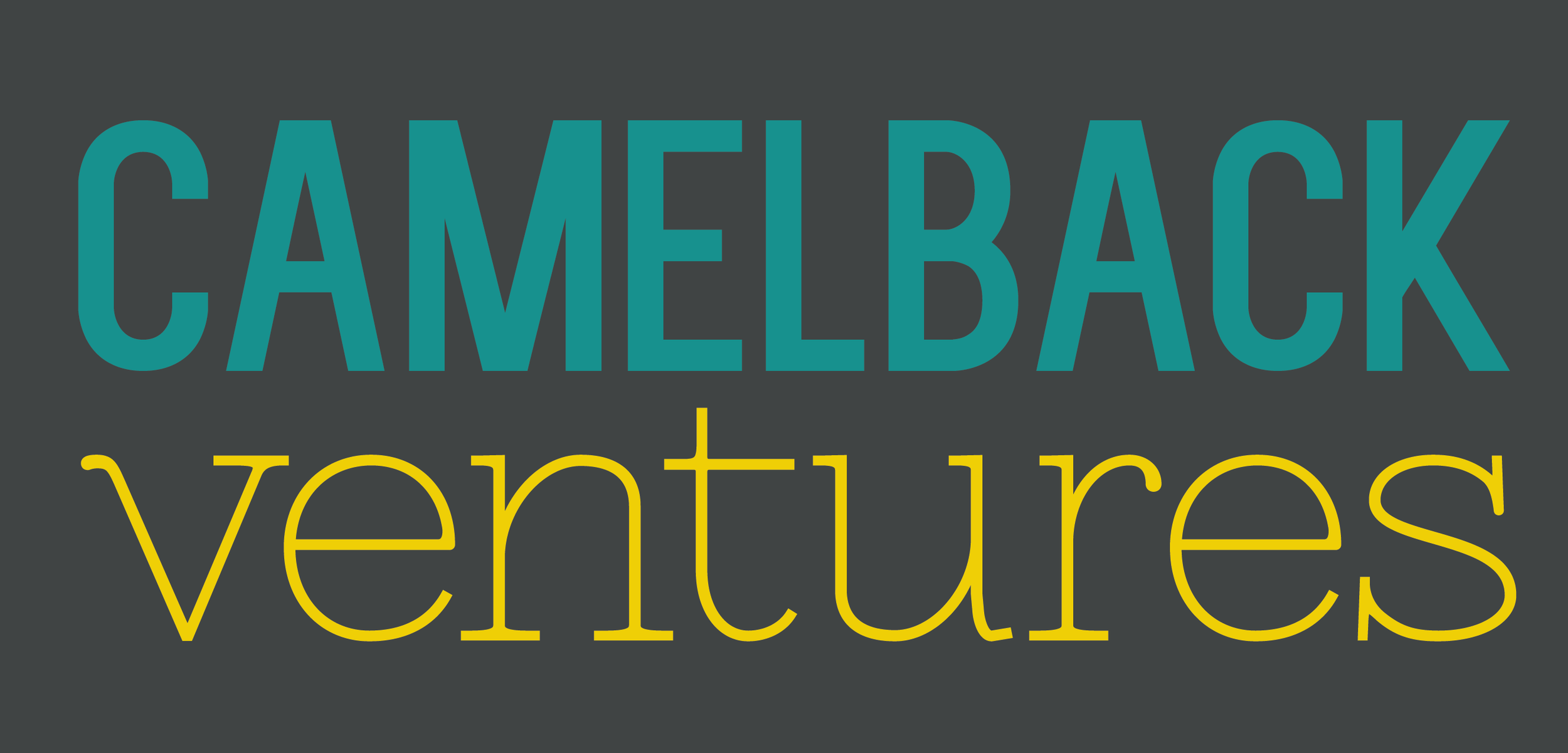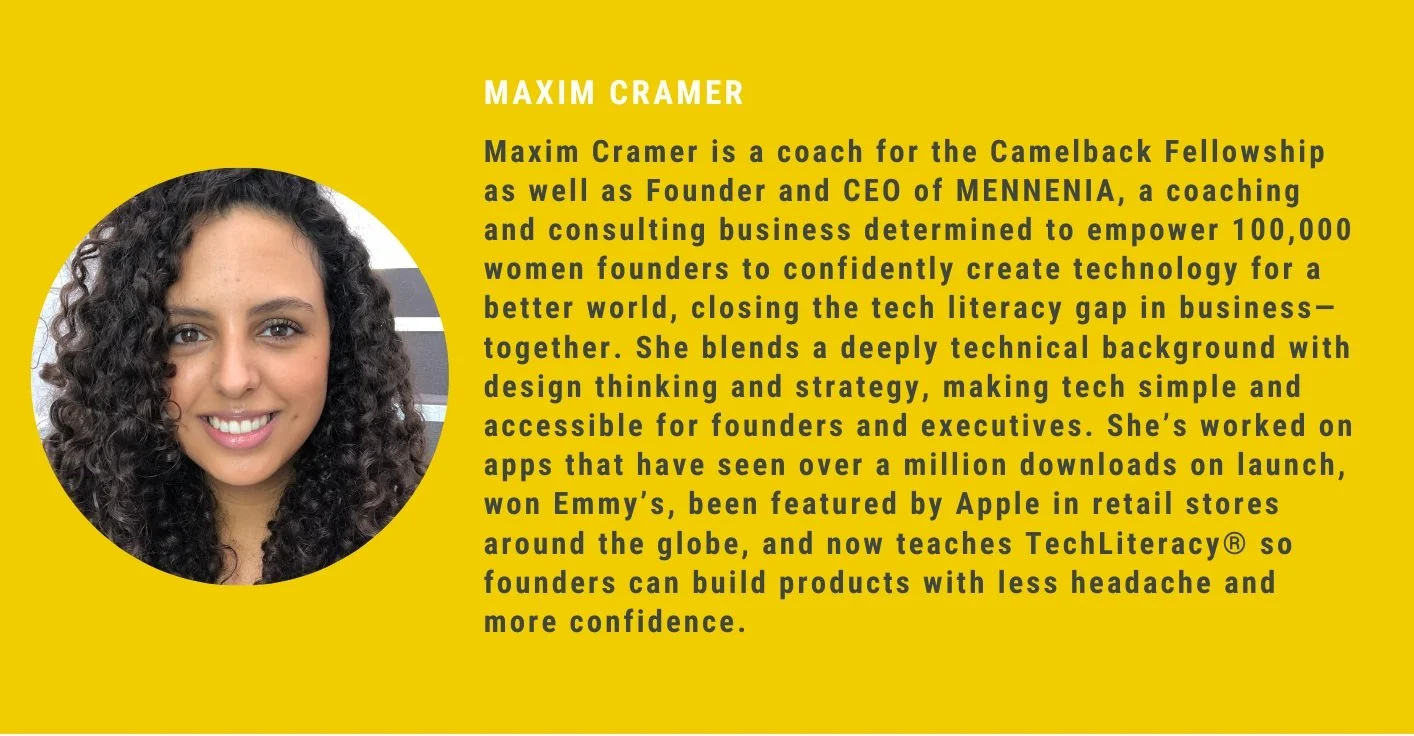7 Things You Need to Know as a Non-Tech Founder of a Tech Venture
By: Maxim Cramer, Coach for the Camelback Fellowship; Founder/CEO of MENNENIA
If you’re reading this article, you probably have a prototype that you’ve tested and want to build into a fully workable product. However, you’re not sure how to do that.
Even if you’ve never written a line of code, you still need to understand technology fundamentals, like how a tech product is built and what it can do for your business. You also need to be comfortable hiring and working with tech teams and be able to communicate effectively with them. In this blog post, we will share a few insights to help you on your journey.
1. The tech stack you choose is vital.
The technology stack you choose as a tech founder will have a big impact on the success of your business. What is a tech stack? It’s the collection of technology the business is choosing to use to create the product or service they are selling. Simply put: a list of all the technology services used to build and run an application. It's important to discuss this thoroughly with your engineers and make sure that you understand what each tool or language can do for your business and how it fits into the overall tech landscape. Too many founders fully outsource their engineering decisions, with little to no involvement in the technologies those engineers choose. Later down the line, they find themselves unable to hire talent familiar with the technologies, or worse, having to start from scratch when the initially chosen tech stack doesn’t allow them to build the kind of venture they envision.
2. Your pitch deck isn't your product strategy.
Your pitch deck should contain a clear and succinct summary of your product strategy, but it isn't the full strategy itself. Founders focus heavily on the pitch deck as it's crucial to secure investment, and that's just it. The pitch deck sells the business, not the product.
To help your team build your product, you also need to have a clear vision of what you're building, how it will solve customer problems, and what a user journey might look like. That document is often called a product strategy or roadmap and it lays out how your venture intends to build your product.
3. Adopt a continuous hypothesis approach.
Even though you need a product strategy, you don't need to have all of the answers right away. Instead, approach the development process with a continuous hypothesis mindset, where you are constantly shifting and learning based on customer feedback. This will help ensure that your product continues to evolve in the right direction.
4. Hire the technical folks you want to work with.
If you don’t have an engineer you can talk to, you’ll have to hire one. You don't have to be a tech expert to make effective hiring decisions. When you are interviewing potential engineers, whether that’s an agency, contractors, or a technical co-founder, focus on the candidate's experience and skills that relate directly to your product or company. Look for cultural alignment and ask specific questions about how they would approach solving certain problems. Ask them to explain technical concepts to you in the simplest language (or drawings!) possible. This will give you an idea of whether they are a good fit early on in your startup's journey.
5. Be precise with who you're looking for.
In addition to culture fit, when recruiting tech talent, make sure you have a clear understanding of what kind of skill set you are looking for. I often receive emails asking if I know any good engineers, but rarely do they include a job description. Engineers focus on different technologies, such as server code, or mobile apps, or web platforms. In turn, they are also proficient in different programming languages as each of those technologies requires a different one. Confusing, I know! The takeaway? A server engineer is unlikely to be a great mobile app developer, so be clear about what the technical skills you need are, based on what you are trying to build. A precise job description goes a long way in finding the right candidate.
6. Ask all of the questions (no matter how silly you think they are).
Don't be afraid to ask questions during the development process, no matter how silly you think they may be. One of my clients once told me how mortified she was when reaching out to her network for a great engineer. Someone asked her: "what language?" Her response? "English, please!", not realising that the person had meant which programming language (see point #5 above).
She laughs about it now, but I think it's a beautiful example of how we all start somewhere and are never done learning. It's normal! And tech teams are experts in their field who should be able to answer any questions you have with kindness, and explain why certain solutions work better than others. So keep on asking!
7. Take advice, but always trust your gut.
No matter how much advice you receive, always trust your gut instinct when it comes to making decisions. Tech decisions are often complex and have far-reaching consequences, and almost every founder I’ve worked with knew when something was wrong. Often, they didn't feel they had enough expertise to call it in the moment, taking the advice of others only to regret it later. Trust yourself.
Bonus: Always be a constant learner.
If you're curious to learn more about this, we offer TechLiteracy®, a 6-week hands-on program with a detailed curriculum, practical step-by-step playbooks, and live office hours to help you build and launch products with smashing success. On time, on budget, and no (bro)lingo required.
_________
Camelback Ventures’ next fellowship application window will open in March of 2023. Interested in joining our next fellowship cohort? Learn more about the Camelback Ventures’ Fellowship and fill out our interest form today!


